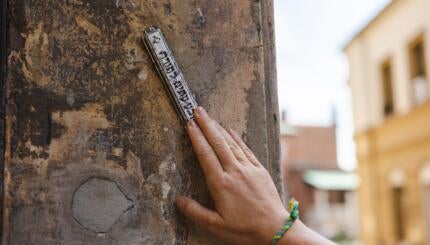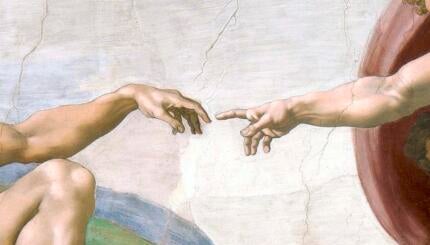Commentary on Parashat Achrei Mot, Leviticus 16:1-18:30
The major theme of our double Torah portion is the Jewish value kedushah, holiness. Though a central tenet of Judaism the word, like the concept, is difficult to translate or comprehend.
This parashah details a number of ways in which God expects us to aspire to kedushah, including the sacrificial offerings and self-denial associated with Yom Kippur, proper offerings to God in the Tent of Meeting, the prohibition against eating blood, forbidden sexual relations between blood kin, numerous laws concerning ethical behavior and meting out justice for the poor and the weak within society. Chief among all these laws is the famous divine demand, “Love your neighbor as yourself.” (Leviticus 19:18) Through speech, worship, eating, sex and norms of justice in all our daily physical activities the entire people of Israel are commanded to create a holy society because: “You shall be holy, for I, the Lord your God, am holy.” (Leviticus 19:3)
Perhaps the best way to understand all this is that being holy means imitating God, who is distinct and separate, through behavior that makes us likewise distinct and separate. The opening verse of Leviticus 19 implies that the Torah understands kedushah as a series of concentric circles: God is most holy, next come the priests and Levites surrounding God’s presence and finally common Israelites who are also holy. All of us, our status notwithstanding, are called by God to be a “kingdom of priests and a holy nation.” (Exodus 19:6)
This call to aspire to kedushah is mirrored in God’s having singled us — the Jews — as a nation to be separate and distinct in our pursuit of God: “I the Lord am your God who has set you apart from other peoples … I have set you apart from other peoples to be mine.” (Leviticus 20:24, 26)
With your help, My Jewish Learning can provide endless opportunities for learning, connection and discovery.
A disturbing misconception of some non-Jews (and Jews as well) is that holy means holier-than-thou. Certainly, the Jews’ emulative relationship with God and its emphasis on separateness could be distorted as a form of inherent supremacism, but that is not its original meaning. It is better to think of kedushah as aspiration through imitation, which inheres in our collective identity. God doesn’t tell us, “You Jews are holy,” God tells us, “I’ve called upon you to live in a holy way which reflects My presence in the world.”
One of the most interesting approaches to kedushah as aspiration-through-imitation is that of the Torah commentator Rabbi Ovadiah ben Seforno (Italy, 1475–1549). Commenting on Leviticus 19:3, he writes:
“The intent of all these foregoing warnings about the people’s behavior (in the first eighteen chapters of Leviticus) was for the Israelites to become holy. The reason for this goal was that they should be like their Creator as much as possible. This is the same as God’s original intention when creating humanity, as Scripture tells us: ‘God said (Genesis 1:27): Let us make man in Our image after Our likeness.’”
Rabbi Ovadiah’s interpretation is striking, perhaps even radical. I cannot think of an explicit connection anywhere in the Torah between the Israelites’ holiness and human beings being created in God’s image. Both ideas are, to be sure, statements about the value of human beings. However, kedushah is a distinct, particularistic idea limited to the Israelites while tzelem elohim (creation in God’s image) is a universalistic idea which embraces all people. But Rabbi Ovadiah conflates the two, transforming kedushah into the unique Jewish expression of the infinite value that all human beings have. Implicit in this claim is that if we Jews have our unique way of expressing tzelem elohim, then all other peoples and nations can also have their unique ways of doing so. No one is superior or inferior, we are all just different.
Rabbi Ovadiah’s comment also raises interesting questions. As we saw, kedushah is an aspiration — Jews only achieve it when they follow God’s commandments. By contrast, in Genesis, tzelem elohim is described as an inherent feature of all human beings. By conflating the two, is Rabbi Ovadiah implying that kedushah is also an inherent feature of being Jewish? Alternatively, is he implying that the human reflection of God’s image is also an aspiration toward which human beings must strive? Whatever he’s implying, it is clear that to strive for kedushah as a Jew is indispensable to being our best human selves and helping humanity achieve the same.



